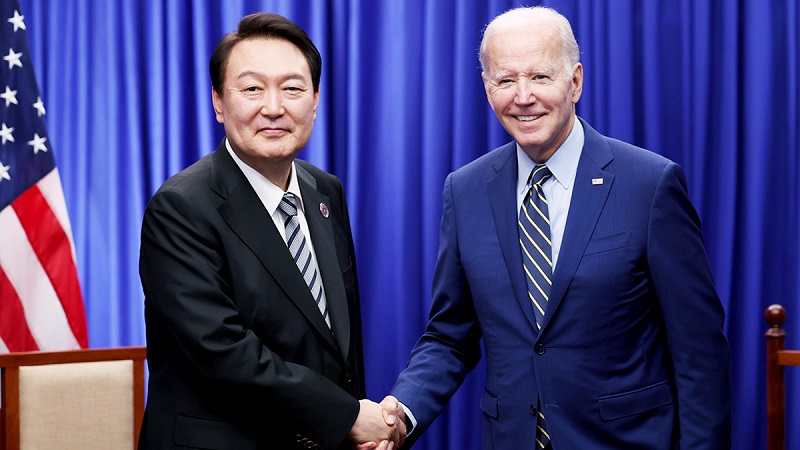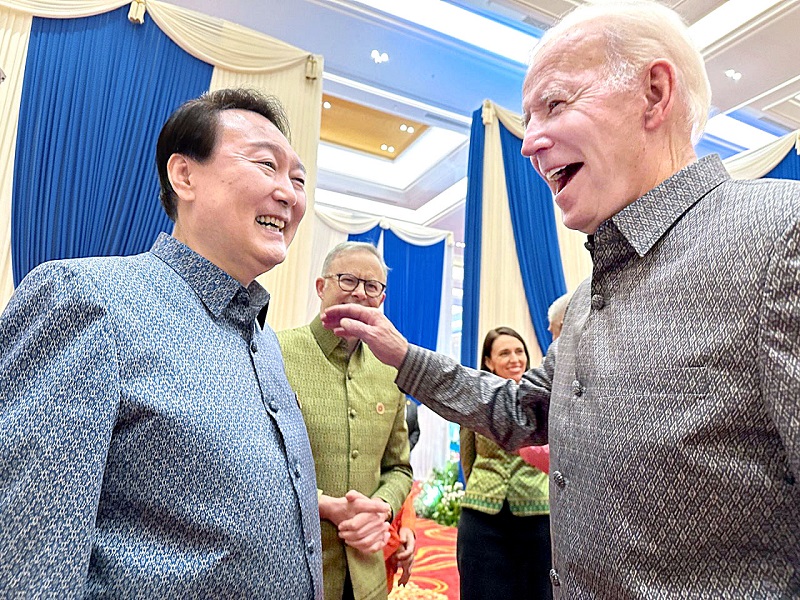Good morning! It’s Monday, April 24, and I’m Mooyoung Lee, a reporter for Katchup Briefing, the Korea Daily’s English weekly newsletter service. In Issue 4 of Katchup Briefing, I will preview South Korean president’s state visit to the United States this week. His visit will highlight the 70th anniversary of Korea-U.S. alliance, but he may have to pick up a very expensive bill during the hospitable dinner.

Yoon will have a bilateral summit with Biden at the White House in Washington on April 26. In the evening, Biden and first lady Jill Biden will host Yoon and first lady Kim Kun-hee for a state dinner.
Yoon will be accompanied by a 122-member business delegation, the largest ever, including the leaders of Korea’s major conglomerates, such as Samsung Electronics Executive Chairman Lee Jae-yong, SK Chairman Chey Tae-won, Hyundai Motor Group Executive Chair Euisun Chung and LG Group Chairman Koo Kwang-mo. The business delegation represents diverse industries, including semiconductors, electric vehicles, batteries, bio, robots, IT, software, defense and media content.
During the bilateral summit, the two leaders are expected to come up with “concrete and practical measures” for cooperation in various areas, including combined defense posture and extended deterrence, advanced technologies and economic security, cultural and people-to-people exchanges, and regional and international challenges.
The next day, Yoon will make an address to the U.S. Congress, making him the first Korean president to do so since May 2013. A formal invitation asking Yoon to address a joint meeting of Congress was signed by House Speaker Kevin McCarthy, Senate Majority Leader Chuck Schumer, Senate Republican Leader Mitch McConnell, and House Democratic Leader Hakeem Jeffries. It is rare for the so-called “big four” congressional leaders to co-sign such an invitation.
Yoon’s state visit is meant to highlight the 70th anniversary of the Korea-U.S. alliance forged from the signing of their Mutual Defense Treaty in October 1953, and to reaffirm the two countries’ shared commitment to democracy, economic prosperity and global peace. Given the 70th anniversary of the alliance and Yoon’s emphasis on the blood bond, both South Korea and the United States might have agreed to raise the level of the bilateral summit to the highest, both on formality and substance, for further cooperation between the two allies.

The U.S. needs to urgently deal with China, Russia, and North Korea, who defy international norms. The U.S. has been leading a crusade to unite the West after Russia’s invasion of Ukraine amid a heated U.S.-China rivalry for global hegemony.
The U.S. wants South Korea, an industrial powerhouse and ally, to play a bigger role in the push than before. After Yoon emphasized cooperation with the U.S. and international solidarity to protect freedom around the globe since taking office, Washington demanded that Seoul side with it on key issues.
The U.S. might be satisfied with the ally’s stern response to North Korea but not so much over Seoul’s approach to China and Russia. Due to apparent resistance from China and Russia, South Korea has been hesitant to put its value diplomacy rhetoric into action, particularly on issues such as security cooperation and human rights.
As a result, the U.S. will want to see a “forward-looking” turn from its ally when it comes to the issues of China and Russia.
To effectively tackle the numerous challenges ahead, Yoon may have to determine the direction of South Korean diplomacy, including how much it will accept U.S. demands regarding the China and Russia issues and how to position itself between the U.S. and China and between the U.S. and Russia.
Responding to U.S. demands, Yoon proactively produced one card.
In an interview with Reuters last week, Yoon suggested that Korea could provide military aid to Ukraine in the event of a large-scale attack on its civilians by Russia. Yoon also stated that Taiwan is not solely an issue between China and Taiwan, but a global matter similar to the North Korea issue. Both Russia and China promptly condemned Yoon’s remarks.
In accepting White House hospitality, Yoon may have to pick up a very expensive dinner bill.
On the other hand, Yoon must secure Biden’s commitment to reassure the South Korean public, who are increasingly concerned about the growing nuclear threat from North Korea.
For the past 70 years, the South Korea-U.S. alliance has successfully deterred a second Korean War. However, with North Korea’s development of nuclear weapons and intercontinental missiles, the alliance is facing new challenges.
On April 14, North Korea test-fired a solid-fuel intercontinental ballistic missile (ICBM) named Hwasong-18 for the first time, marking significant progress in its missile capabilities. North Korea currently has at least eight types of missiles that can carry tactical nuclear warheads, potentially targeting all of the Korean Peninsula or even U.S. bases in Japan.
North Korea appears determined to complete its ICBM technology and mountable nuclear warheads, and it is only a matter of time until the North’s ICBMs will be capable of hitting the U.S. mainland.
The South Korean public demands that Yoon ensure trust in Washington’s extended deterrence through the nuclear umbrella. Many South Koreans doubt whether the United States would risk a nuclear attack from North Korea on Washington to defend Seoul.
A public poll conducted at the beginning of the year showed that 77 percent of South Koreans support the country developing nuclear weapons on its own due to skepticism over the U.S. provision of a nuclear umbrella in times of crisis.
The bilateral summit between Yoon and Biden should address the question of extended deterrence. We hope that the U.S. will fully address South Korea’s security anxieties and uphold common values and alliance based on trust and cooperation.
BY MOOYOUNG LEE [lee.mooyoung@koreadaily.com]




